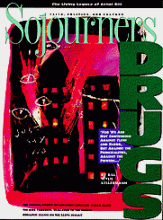Pat Buchanan's terror campaign in the Republican primaries has weakened and disoriented George Bush, and I can't say I'm sorry. It has also forced debate about the National Endowment for the Arts (NEA) back into the headlines--on the most skewed and reactionary of terms. Never mind that Buchanan's homophobic NEA attack ads were themselves the sleaziest things seen on broadcast TV in this decade. The issue is back out in the arena.
Bush reacted by firing NEA chief John Frohnmayer. His party chairman, Richard Bond, suggested publicly that the government should "get out of this business" of deciding "what is art."
By the time you read this, Buchanan may well have been laid quietly to rest--and the NEA issue with him--for this year. But given Buchanan's success, it is almost certain to return for as long as we have a public arts agency.
Art subsidies do involve some decisions about what is art. But they also involve judgments about what art is necessary or worthy, and, perhaps most important, about who decides. It's a complicated and problematic issue, and one that requires more than 30 second's (or even one page's) worth of thinking. But here goes...
Read the Full Article
